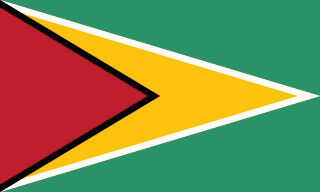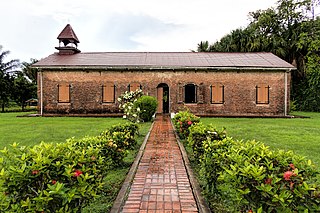The history of Guyana begins about 35,000 years ago with the arrival of humans coming from Eurasia. These migrants became the Carib and Arawak tribes,who met Alonso de Ojeda's first expedition from Spain in 1499 at the Essequibo River. In the ensuing colonial era,Guyana's government was defined by the successive policies of the French,Dutch,and British settlers. During the colonial period,Guyana's economy was focused on plantation agriculture,which initially depended on slave labor. Guyana saw major slave rebellions in 1763 and 1823. Following the Slavery Abolition Act of 1833,800,000 enslaved Africans in the Caribbean and South Africa were freed,resulting in plantations contracting indentured workers,mainly from India. Eventually,these Indians joined forces with Afro-Guyanese descendants of slaves to demand equal rights in government and society. After the Second World War,the British Empire pursued policy decolonization of its overseas territories,with independence granted to British Guiana on May 26,1966. Following independence,Forbes Burnham rose to power,quickly becoming an authoritarian leader,pledging to bring socialism to Guyana. His power began to weaken following international attention brought to Guyana in wake of the Jonestown mass murder suicide in 1978.

British Guiana was a British colony,part of the mainland British West Indies,which resides on the northern coast of South America. Since 1966 it has been known as the independent nation of Guyana.

The Guianas,also spelled Guyanas or Guayanas,is a region in north-eastern South America. Strictly,the term refers to the three Guyanas:Guyana,Suriname and French Guiana,formerly British,Dutch and French Guyana. Broadly it refers to the South American coast from the mouth of the Oronoco to the mouth of the Amazon.

Kaieteur Falls is a single-drop waterfall on the Potaro River in Kaieteur National Park,central Essequibo Territory,Guyana. It is 226 metres (741 ft) high when measured from its plunge over a sandstone and conglomerate cliff to the first break. It then flows over a series of steep cascades that,when included in the measurements,bring the total height to 251 metres (822 ft). While many falls have greater height,few have the combination of height and water volume,and Kaieteur is among the most powerful waterfalls in the world with an average flow rate of 663 cubic metres per second. Kaieteur Falls is about four and a half times the height of Niagara Falls,on the border between Canada and the United States,and about twice the height of Victoria Falls,on the border of Zambia and Zimbabwe in Africa.

Charity is a small township in Guyana,located in the Pomeroon-Supenaam Region No.2,which is part of the Essequibo County.
Arthur James Seymour,or A. J. Seymour,was a Guyanese poet,essayist,memoirist,and founding editor of the literary journal Kyk-Over-Al.

Hilton Cheong-Leen,CBE,JP was a Hong Kong politician and businessman. He is the longest uninterrupted serving elected officeholder in Hong Kong history as an elected member of the Urban Council of Hong Kong for 34 years from 1957 to 1991. He was also the first Chinese chairman of the council from 1981 to 1986. He had been a long-time chairman of the Hong Kong Civic Association,one of the two quasi-opposition political groups in the post-war Urban Council. From 1973 to 1979,he was appointed unofficial member of the Legislative Council of Hong Kong. From 1985 to 1988,he was again among the first elected members of the Legislative Council through Urban Council constituency in the first Legislative Council election in 1985.
The National Library of Guyana is the legal deposit and copyright library for Guyana. Unlike many national libraries,it is also a public lending library and the headquarters of Guyana's public library service,with branches extending throughout the country. Founded in 1909,the National Library of Guyana is situated on the corner of Church Street and Main Street in central Georgetown. In 2007,the library recorded a collection of 397,893 books and a total of 22,058 members. Its collection includes the papers of A. J. Seymour and Ian McDonald.

Guyana,officially the Co-operative Republic of Guyana,is a country on the northern coast of South America,part of the historic mainland British West Indies. Guyana is an indigenous word which means "Land of Many Waters". Georgetown is the capital of Guyana and is also the country's largest city. Guyana is bordered by the Atlantic Ocean to the north,Brazil to the south and southwest,Venezuela to the west,and Suriname to the east. With a land area of 214,969 km2 (83,000 sq mi),Guyana is the third-smallest sovereign state by area in mainland South America after Uruguay and Suriname,and is the second-least populous sovereign state in South America after Suriname;it is also one of the least densely populated countries on Earth. It has a wide variety of natural habitats and very high biodiversity. The country also hosts a part of the Amazon rainforest,the largest tropical rainforest in the world.
The first numbers of Chinese arrived in British Guiana in 1853,forming an important minority of the indentured workforce. After their indenture,many who stayed on in Guyana came to be known as successful retailers,with considerable integration with the local culture. The most notable person of Chinese ancestry was the Former Guyana President Arthur Chung,was independent Guyana's first President from 1970 to 1980,and the first Chinese head of state of a non-Asian country.

Alfred Athiel Thorne,LLD,MA,also known as A.A. Thorne,was a well-regarded elected statesman,author,pioneer for educational access,and human rights advocate in British Guyana. In 1894,Dr. Thorne founded and oversaw a co-educational private secondary school,providing educational access to students regardless of their sex,gender,ethnicity,color,or socio-economic status. Hailed as the "Hero of The People",Thorne served as a popularly-elected official for more than 50 years,working to unify the collective voices of working-class white British colonists,Indo-Guyanese,Afro-Guyanese,Chinese,Portuguese,and Aboriginal Amerindian communities across British Guyana. He served multiple elected and appointed roles at both the national and municipal levels,including as Mayor of British Guiana's capital city,Georgetown. Thorne served many decades as an educator,columnist writer,and elected official in British Guiana,having a lasting impact for generations by advocating for educational access,workplace safety,human rights,democracy,and self-determination.

The history of the Jews in Guyana goes as far back as the 1600s. Representation has always been low,and by the 1930s there was neither an organized Jewish community nor a synagogue in the capital city of Georgetown. In the late 19th and early 20th centuries,several Jewish families immigrated to British Guiana from Arab lands to avoid persecution and expand business opportunities.

General elections were held in British Guiana in 1916.

The Combined Court was the legislature of British Guiana until 1928. In its final form,it consisted of a sitting of the Court of Policy together with the elected Financial Representatives.

The Court of Policy was a legislative body in Dutch and British Guiana until 1928. For most of its existence it formed the Combined Court together with the six Financial Representatives.

Karinambo is a village in Guyana. Charles Barrington Brown stayed in the Amerindian village near the Takutu Savanna in the 1870s.

Plantation Peter's Hall was a plantation on the east bank of the River Demerara in Dutch Guiana and British Guiana. It was probably laid out in the mid-eighteenth century and by the early nineteenth century had over 200 slaves before that institution was abolished in the British Empire.
Egbert Martin,writing under the alias Leo,was a 19th-century Guyanese poet.
Guyanese nationality law is regulated by the 1980 Constitution of Guyana,as amended;the Citizenship Act of 1967,and its revisions;and various British Nationality laws. These laws determine who is,or is eligible to be,a national of Guyana. Guyanese nationality is typically obtained either on the principle of jus soli,i.e. by birth in Guyana;or under the rules of jus sanguinis,i.e. by birth abroad to parents with Guyanese nationality. It can also be granted to persons with an affiliation to the country,or to a permanent resident who has lived in the country for a given period of time through naturalisation. There is not currently a program in Guyana for persons to acquire nationality through investment in the country. Nationality establishes one's international identity as a member of a sovereign nation. Though it is not synonymous with citizenship,for rights granted under domestic law for domestic purposes,the United Kingdom,and thus the Commonwealth,have traditionally used the words interchangeably.












